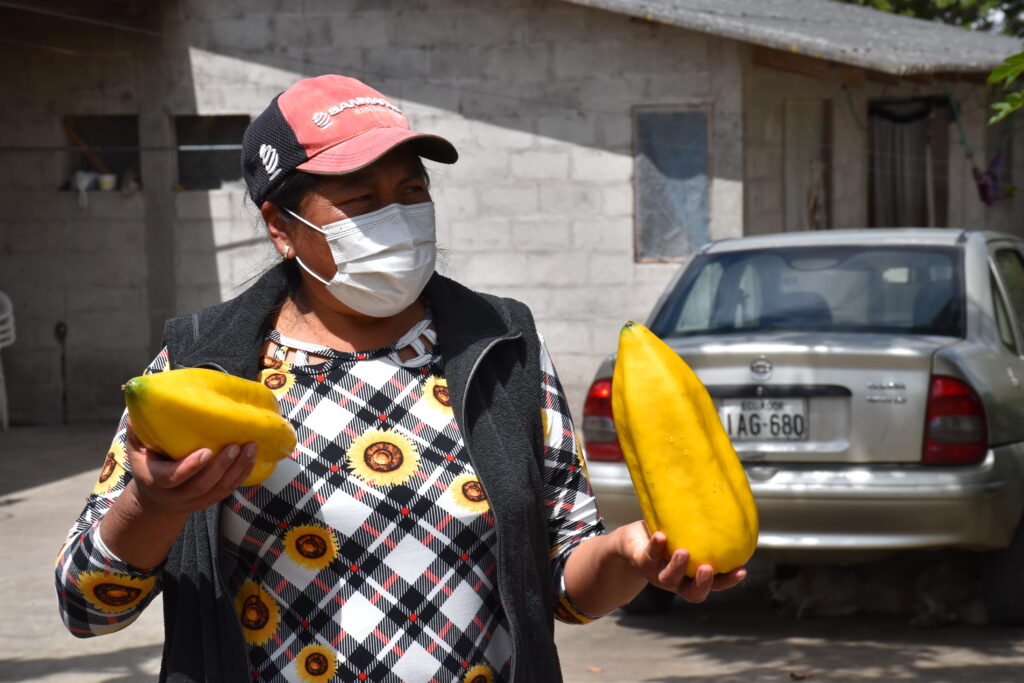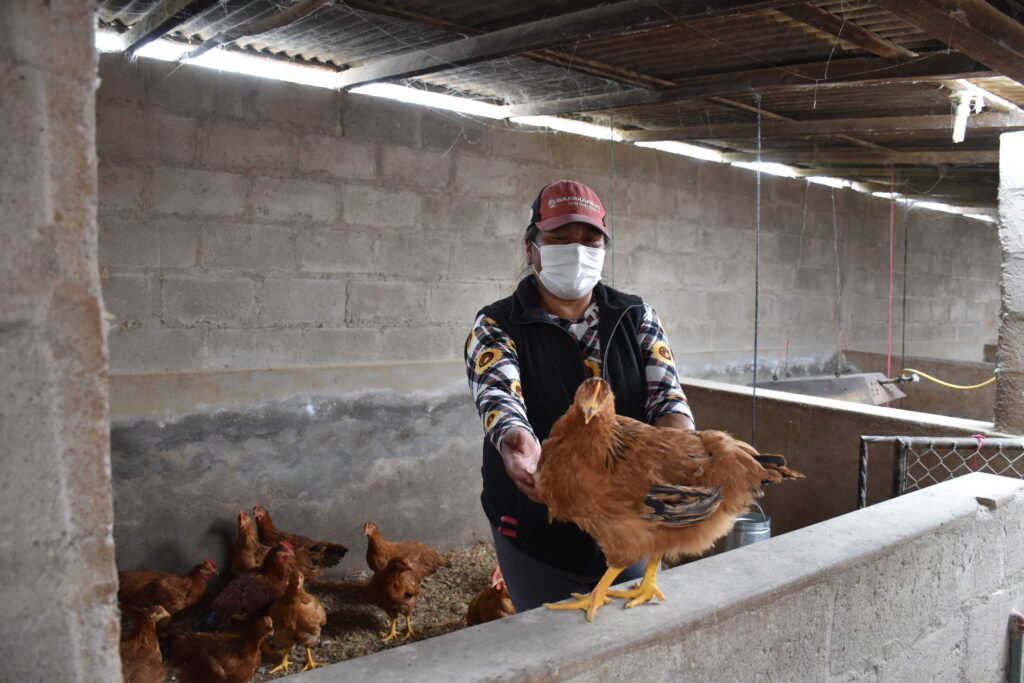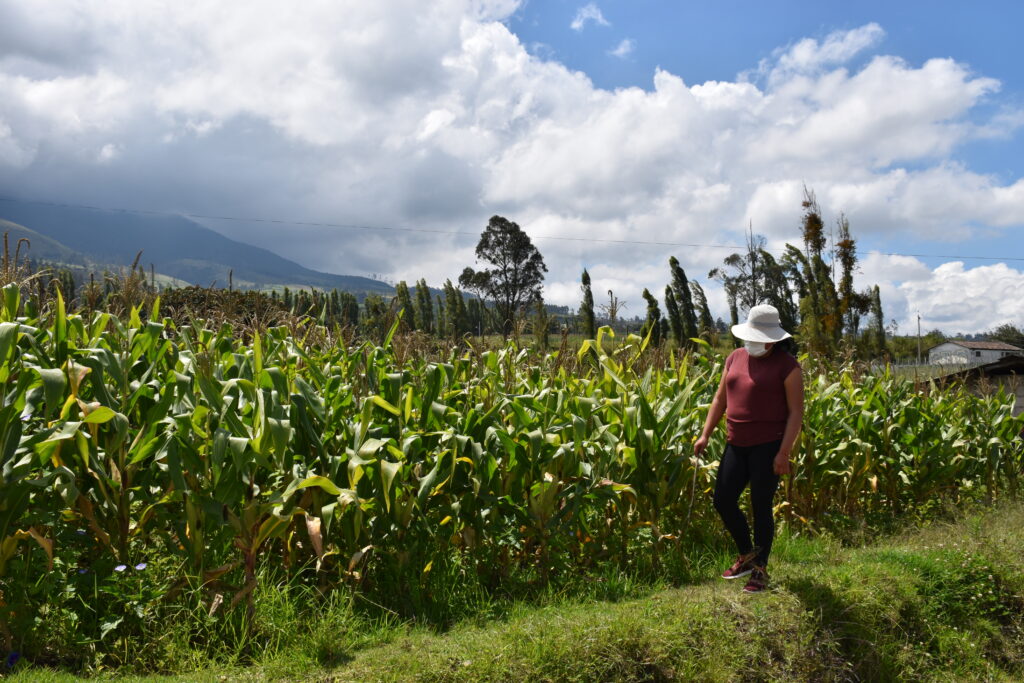By Majidah Hashim, Communications Manager for Inclusive Green Finance & Gender Inclusive Finance, AFI
“When my twin daughters were in school, they used to wake up at three every morning to clean the animal sheds. When it was time for them to further their education, we were able to sell the animals to pay for their university education,” shares Angelita Guamán, a single mother of three.
Guamán runs a farm located in the countryside of Ecuador. Thanks to a financing arrangement with the Cooperative de Ahorro y Credito Mujeres Unidas (CACMU), she grows fruiting and aromatic plants, and raises pigs, ducks, chickens and guinea pigs. Her prized crop, however, is babaco, also known as the mountain papaya, which usually start fruiting about ten months after planting and is resilient to Ecuador’s high altitudes.
“Being a member of the cooperative helps me a lot because they allow me to do loan repayments every three or six months instead of monthly which I am unable to do. It is not possible to sow the field and collect yield within a month,” says Guamán.
The babaco trees’ long germination and maturity period is one of the reasons why Guamán appreciates CACMU for its principle-based microcredit facility.

Guamán with her prized crop, the babaco, also known as the mountain papaya /AFI
“Guamán is specifically the kind of person that we want to reach out to. In traditional banking, it would have been quite difficult for her to receive credit for this type of business,” says Jeaneth Chavez, Deputy Manager of CACMU. According to Chavez, Superintendencia de Economia Popular y Solidaria (SEPS) has played a crucial role in enabling cooperatives to help microentrepreneurs like Guamán.
SEPS supervises Ecuador’s savings and credit cooperatives, real estate cooperatives, associations, and other aspects of the country’s “solidarity” economy. The regulator works on four pillars: regulation, supervision, stakeholder coordination and decision making, transparency and strengthening of financial inclusion.
“It is so admirable what a single woman can do, because running a farm is quite hard,” said Chavez. “She had achieved all this because she is empowered. It is therefore important that the superintendency reached out to precisely these people.”
As a member of AFI’s Inclusive Green Finance Working Group, SEPS has been a champion of sustainable finance within the network and has made eight Maya Declaration commitments in the area of financial inclusion since 2019. Earlier this year, the regulator launched its environmental and social risk management (ESRM) guidelines that aim to boost financial inclusion in its credit cooperative sector. The guidelines are also bringing the country closer to fulfilment of its national climate pledges under the Paris Agreement.

Guamán tends to one of the many animals on her farm /AFI
“The ESRM guideline makes it possible to identify, categorize, monitor and evaluate possible environmental risks in the credit portfolios, encouraging a culture and commitment to social and environmental responsibility in the financial system,” Superintendent Hernández explained.
Developed with support from peers in the network and an AFI grant, the guidelines intend to limit any environmental and social risks arising from credit decisions and further bolster green finance in the country. The guidelines encourage a commitment to social and environmental responsibility in the popular and solidarity financial system and provide a safeguard against credit decisions that would have negative environmental or social impacts.
“Customers of the financial system need to be protected. We must strive to guarantee financial inclusion and gender equity as main components of our regulation. We want to maintain not only the right way to work with credit but also ensure that cooperatives remain principle-driven,” highlights Dr. Hernández.
With a portfolio of about USD 31 million, CACMU cooperative has been providing financing for all credit segments, with a special focus on microcredit and microenterprises. Comprised of approximately 30,000 partners, 63 percent of whom are women, CACMU also teaches members to create business plans and runs other financial literacy programs According to CACMU’s Chavez, the core mission of the cooperative is for women not only to be financially independent, but also to thrive socially.

Growing the farm has enabled Guamán to raise her family in a sustainable manner /AFI
“Being able to receive credit from the cooperative has helped me develop and grow this farm as it provided me with the means I needed,” Guamán explained.
Often disproportionately impacted by natural disasters and gradual climate impacts climate change, women have also been affected more than men by the global pandemic. While women make up approximately 39 percent of employment, studies have shown that over the course of the COVID-19 pandemic, they accounted for 54 percent of overall job losses. Despite this crucial vulnerability, it is important to consider that women are important agents of change where it comes to climate mitigation and adaptation.
“With additional poverty, unemployment and impacts of COVID-19, we find it necessary to support the economic recovery of the agricultural sector which includes environmental responsibility and financial inclusion with gender perspective,” Dr. Hernández explained, adding that due to its governing community-centric principles, social and popular economic sectors become key strategic actors for the superintendency.
“Consumer protection with a gender perspective can strengthen financial inclusion in the cooperative sector in Ecuador”, Dr. Hernández added.
Having the farm to rely on has also created a means of resilience for Guamán’s family during the peak of the COVID-19 pandemic. “The pandemic did affect the farm, but the animals were an especially big help. We were not able to go to market, but people came to the farm and bought produce,” said Guamán.
Bringing together the need for regulation and targeted financial inclusion strategies, inclusive green finance is helping Ecuador to reap not only environmental but also social-economic opportunities for greater financial stability and a more sustainable future where no one is left behind. AFI’s inclusive green finance working group (IGFWG), which SEPS is a member of, currently includes 59 member from 52 countries and has effected 11 policy changes. The working group has also produced eight knowledge products.
“My son is now twelve years old. I now have the opportunity to continue to educate him the same way,” says Guamán.
#
AFI’s inclusive green finance workstream, is part of the International Climate Initiative (IKI), which is supported by the German Federal Ministry of the Environment, Nature Conservation and Nuclear Safety (BMU), based on a decision of the German Bundestag.
AFI’s gender inclusive finance workstream is financed by the Swedish International Development Cooperation Agency (Sida) and other partners.
#
About Superintendencia de Economia Popular y Solidaria (SEPS)
SEPS is the regulatory and supervisory organization of Ecuador, which supervises more than 470 financial entities and 15,866 organizations of the Popular and Solidarity Economy.
SEPS works on four fundamental supervision pillars: an adequate regulatory framework, an efficient supervision model, stakeholder coordination and decision making, along with transparency and strengthening of financial inclusion.
Stakeholder coordination and decision making is the most significant as it provides the most vulnerable and excluded segments of society, especially women and youth, with access to financial services. This leads to better financial decision taking and improvements in well-being.
SEPS is a member of AFI since 2019 and has made Maya Declaration commitments on financial inclusion related to gender inclusive finance and inclusive green finance.
About AFI
AFI is the world’s leading organization on financial inclusion policy and regulation. Over 100 member institutions make up the AFI network including central banks, ministries of finance and other financial regulators from 89 developing and emerging countries. AFI works on empowering policymakers to increase access and usage of quality financial services for the underserved through formulation, implementation and global advocacy of sustainable and inclusive policies.
AFI’s FILAC comprises 12 AFI member institutions, including financial regulators and policymakers in the Bahamas, Costa Rica, Dominican Republic, Ecuador, El Salvador, Haiti, Honduras, Mexico, Paraguay, Peru and Suriname. Launched in 2016, it aims to be the driving force for advancing financial inclusion in Latin American and Caribbean

 About
About
 Online
Online
 Data
Data





















